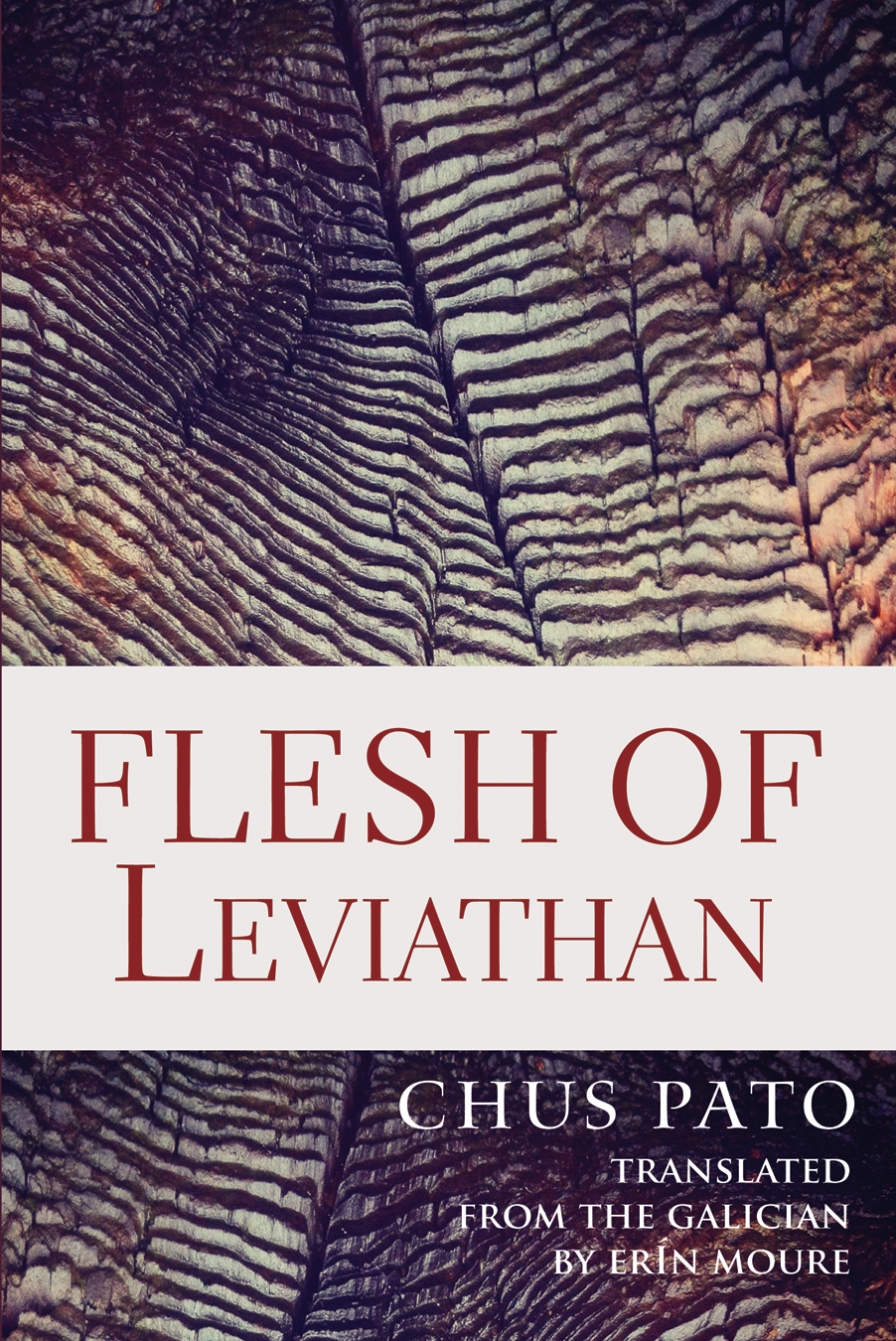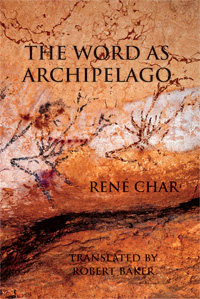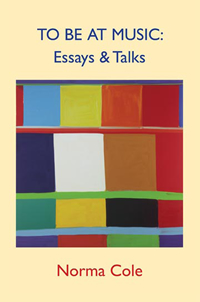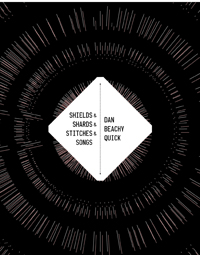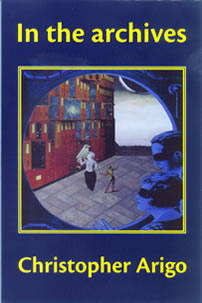Description
In Flesh of Leviathan, Chus Pato alters her cadence to record, in sombre lyric form, the direct address of a singular voice that seems to emerge from time itself. In these poems, worldly things are largely absent and those present are iconic: birds, skies, winds. Through them, Pato articulates the possibility of thinking, the foreignness of any thinking subject, the borders to be crossed to move thinking forward, and the relation of thinking with time as humanity approaches—or not—time’s end. A dense majesty emerges, an urgency, and an insistent intimacy with the natural world. In Pato’s language, the turmoil of the body is palpable but cannot be articulated; our humanity can be noted, but cannot be written down.
with an unmending foreword by Jen Hofer
Chus Pato’s Flesh of Leviathan evokes the ambiguous, mythical body of Leviathan, which is both dragon and whale, devouring predator and post-apocalyptic feast, suggesting the machinery of state at the same time as the non-human wilderness. In richly sensual imagery, a process of linguistic rewilding releases the birds, forests and flowers of poetic invention and fills them with unexpected energies. We learn to think beyond, though and outside a lyric self that is perpetually remade. These poems challenge themselves at every turn, searching for the elusive ‘body of the word’, a body that ‘doesn’t fit into the letter, not into the voice when we speak it.’ The work of the poet, Pato suggests, is nothing less than a performance of the impossible: ‘okay now sing / this blank page’; in such an act, the word is pushed to its limits and returned to us ready for new uses. With this resonant translation Erín Moure recreates a poetry that can ‘write the voice as a foreign country’ as it ‘hovers between music and thought’.
Zoë Skoulding, author of The Museum of Disappearing Sounds
With phrase-weights as lilting as birdlight through a chimeric global rotunda, Pato’s delicate contemplation of being and nothingness shivers and shimmers. In this windclimbing translation by Erín Moure, each poem opens a “voyage of light toward its eclipse.” If you attach too quickly to the stunning metaphor, slip along any of Pato’s deft, slender endlines and notice where its next visible glint lands, both drawing and erasing what language can and cannot do. I was undone by this poetic cycle’s undulations, which transport both gorgeous elegy and a summons to responsible presence.
Margaret Christakos, author of Multitudes
About the Author
Excerpt
Chus Pato (full name María Xesús Pato Díaz, born in Ourense, 1955—) teaches history and geography in a small city in central Galicia in thenorth-west of Spain, and writes in the Galician language. Her sixth book of poetry and first in her pentalogy Decrúa (Tilth or Arable), m-Talá, broke the poetic mould in Galicia in 2000. The first four books of the pentalogy, all translated by Erín Moure, appeared in the UK as m-Talá, Charenton, and Hordes of Writing (Shearsman), and in Canada as Secession (BookThug, published with Insecession by Erín Moure). Flesh of Leviathan, the final text in the pentalogy, is the first to be published in the USA. Hordes ofWritingreceived the 2008 Spanish Critics’ Prize and the 2009 Losada Diéguez Prize. In 2013, the Galician Booksellers’ Association celebrated Chus Pato as Author of the Year. In all her work, Pato refashions the way wethink of the poetic text, of words, bodies, political and literary space, andof the construction of ourselves as individual, community, nation, world. Her works have made her one of the most revered and iconoclastic figuresin Galician and European literature.
Erín Moure has published 17 books of poetry, and has translated 13 volumes from French, Spanish, Galician and Portuguese into English, by poets such as Nicole Brossard (co-translator), Andrés Ajens, Louise Dupré, Rosalía de Castro, Chus Pato and Fernando Pessoa. Moure’s work has received the Governor General’s Award, Pat Lowther Memorial Award, A.M. Klein Prize, and has been a three-time finalist for the Griffin Prize (twice for translation). In 2014 she published Insecession, a biopoetics echoing Chus Pato’s Secession; both appeared as one book from BookThug. Her French/English play-poem-cabaret Kapusta, a sequel to The Unmemntioable, appeared from Anansi in 2015. Flesh of Leviathan is Moure’s latest translation, and her fifth of Chus Pato.
A brief interview with Erín Moure
(conducted by Rusty Morrison)
I could not believe our luck, and your faith in us, when you offered Omnidawn your translation of Chus Pato’s FLESH OF LEVIATHAN. I imagine that many readers will be very familiar with Chus Pato’s history and writings, but some may not be. I think it would be wonderful if you’d share what will be most engaging, most relevant to a new reader regarding this text, its importance, its position in Chus Pato’s trajectory.
The work of acclaimed European poet, Chus Pato, who is Galician and writes in the Galician language from her native land in the NW of Spain, has been formally available in the USA in English since Greywolf Press’s New European Poets in 2008, and informally before and after that on the internet, but only in dribs and drabs. Her work has been more available in the UK, and a bit more in Canada because I live and work there. It’s exciting to see a book of Pato’s come out in a bilingual edition from Omnidawn, closer to American readers! Flesh of Leviathan is the fifth book in her pentology Decrúa. That title means Tilth, or Furrowing or Tillage or Breaking Ground; we don’t have a word in English as condensed and powerful as “Decrúa,” which means to turn over soil for the first time, and refers to a period in European history when nomadic peoples settled and began the process of forming nations. The whole pentology might be seen as a beginning, then.
Flesh of Leviathan marks a departure from Pato’s previous four books (m-Talá, Charenton, Hordes of Writing, Secession) in that its poems are not in hybrid prose and mixed forms, with multiple and overlapping speakers; this book holds discrete poems, of uneven lines, and returns to a lyric poetic and the address of a singular voice. As the title indicates, it is post-apocalyptic; in the Talmud, the flesh of the monster Leviathan is eaten after the final judgement, by the Just, and served to them by God, who has until then just sported with the beast. As a post-apocalyptic book, it occurs resolutely in the present tense and time. It is haunting, frightening, and hopeful all at once.
Many writers reflect upon the natural world, using their writing to bridge a tangential interconnection between the nonhuman and the human. But Chus Pato is unique in her use of language, which is neither simple mediation of otherness nor simple meditation on otherness. In your exquisite translator’s note you propose about this work: “In these poems, worldly things are largely absent and those present are iconic: birds, skies, winds. Through them, Pato articulates the possibility of thinking, the foreignness of any thinking subject, the borders to be crossed to move thinking forward, and the relation of thinking with time as humanity approaches—or not—time’s end. A dense majesty emerges, an urgency, and an insistent intimacy with the natural world.” I know that readers only need to enter the work to find for themselves this ”insistent intimacy with the natural world,” but I wanted to give you the opportunity here to speak to any particular moment in the text that is, for you, especially resonant with this insistence, and or demonstrates “the borders to be crossed to move thinking forward, and the relation of thinking with time.”
Your words make me think of the poem “Jena,” in which Chus lays clear the challenge—that we have forgotten how to think, that we are not thinking, yet we can learn, with our hearts, the entire language, even if it is past us, even if thinking now has to be something else. It is one of the few poems where she mentions thinking explicitly. The word Jena, of course, refers to the cusp of the 18/19th century and the initial period of German Romanticism, to the Jena Circle of thinkers and artists. In a sense, she traces her lineage as a poet back to Jena. Are we too, now, at that moment of history when new thinking is possible? She doesn’t answer that, but implies it is necessary, and that the past is part of the future.
If it works like this
if we think using names
if memory’s a container in which names are inscribed
if learning by heart is to disconnect names from their meaning
thinking’s done with names that signify nothing
with the names of night
given into oblivion
thinking (as art) is a thing of the past
so
where you
I
whosoever
learn in one stroke
stroke of the heart
the entire language
is a thing
of the past
I can only imagine the enormous challenges that a translation demands. Could you speak to any particular aspects of the work of translating this text—any issue that surprised, challenged, enthralled, exasperated you? And/or would you say anything about your views on the art of translation? I realize that this question is impossible to answer in a short space. But anything you can tell us will be a gift.
There are always challenges in translating, of course. In this book, Chus’s diction is very condensed; even the linespaces that appear blank are condensations of thought. In condensing, a poet in any language always uses to the maximum some particular aspects of their own language that help condense, yet they aren’t necessarily available in another language. In translating this book from Galician, one of the critical issues that I faced was that, in Galician, you don’t need to use personal pronouns as subjects for verbs; the verb declension tells you what you need to know about the subject. Thus, one of the things you don’t need to know is if a third person singular subject is male or female or neuter. If that’s important, you can add the pronoun, but most often, it is not an issue. In English, I am forced to make a choice. And the presence of the pronoun leaks energy from the verb. The pulsing insistence of a Galician verb is not present in English, and the tension is altered, reduced.
For example, in the poem above, I could have ended the poem with the stanza:
of the past
as “é cousa” means it is, or it’s a “thing” or “something to do with”… but in Galician, there’s also another echo that connects that line to the line before… so you can also read “the entire language is a thing of the past” or “the entire language is about the past” or “the entire language is of the past”. This provides, as well as an echo, a rhythmic continuity to the two lines, though they are separate and separated by a linespace. I decided here, as I did in many places in the translation, to elide the subject pronoun and allow the gap between stanzas to also echo a continuity in English.
As for my theory of translation: I just try to recreate for the English language reader as clearly as possible, the poem that confronts the readers in the original language. I try to allow the resonances the poem has for the first reader, and its soundscape, to traverse into the new language. As much as I can.
Could you talk about any writers &/or artists &/or thinkers who have influenced you in this work of translating Chus Pato? (in what direct or indirect ways have you felt this occur?) And/or could you talk about who are you reading currently? With whom do you feel a kinship or a provocation or…?
Well, the Talmud, obviously; the arguments of the Talmud and the mystery of its declarations, and how they have to resonate in our head before we can settle on what they mean, and then they refract and mean differently. As well, I think about romanticism, about Pato’s claim that we are still in the epoch of romanticism opened by the Jena Circle. A view I share, as it coincides with Lyotard’s view that the postmodern is in and of the modern, and works against the modern from the inside. Pato does that.
My own current readings are readings of philosophers also dear to Pato: Giorgio Agamben (currently L’uso dei corpi, The Use of Bodies) and Jacques Rancière (Aisthesis). I’m rereading the recently deceased Bolivian poet Emma Villazón’s second book, Lumbre de ciervos, and rereading Caroline Bergvall’s Drift, for its focus on both migration and abandonment, and on the moral imperatives involved in each, and each in our lives, all our lives.
Since we’ve learned a bit about Chus Pato, would you tell me a bit about yourself? Anything you are willing to share that might not be in your short bio that is published in the book?
I’m a poet and translator, a Canadian a bit at odds with her own society (where translation of foreign poets is not highly valued by official culture – only one of Pato’s books has been directly published in Canada, and that due to a bit of a trick, which is to say, I wrote a companion book a bit longer than Chus’s Secession and published them together), dedicated to poetry and translation of poetry, and to joy, really, and fairness. And kindness. I live as modestly as I can, to make all that possible.
You were instrumental in the selection of the image that is used in the cover design for this book. Would you describe your process and ideas as you imagined a cover image? How does this cover align with your intentions for the book?
The image is a close-up of the rings of a huge stump of driftwood cedar, and reflects the original Galician cover, which was an image of petrified wood. The rings in this photo look almost like a reptilian skin; they are worn inward by the lap of waves. It’s a land image that is also an oceanic image, where the tree, a living thing pulled by the soil, meets the waters, also a living thing — but pulled by the moon. In this image, the Leviathan, the monster of the title, is a tree and its flesh is these rings, this meeting of forces. The rings are inscription, too; they are the tree’s writing. Curiously, it makes me think of Pato’s poem “Dialogue,” in which a singular voice declares, to a distant and male figure of authority:
in the language of beasts
sire
in that language
I write
Here the poem refers to inscription of a first thinking; the human emerges from a language that is not human. It may also serve as a political comment, in that during the Francoist repression, Galicians could not be educated in their own language. Their language, Galician, was at times referred to as a language good for talking to animals. Pato insists: I write in that language. It is not mute. Its transformative power endures.
Rhythm of the Eye
our language
that
which bleeds dry in the mouth
a people bears upon it all the weight of devastation
walks in the light of its eclipse
free
and is not hostage to the spirit
is not hostage to death
exposes itself
and is immortal
like a future
swift
uncertain
the rivers vanquish gravity
abandon the Earth
the borders as they’re already overrun
this final one
by teeth

